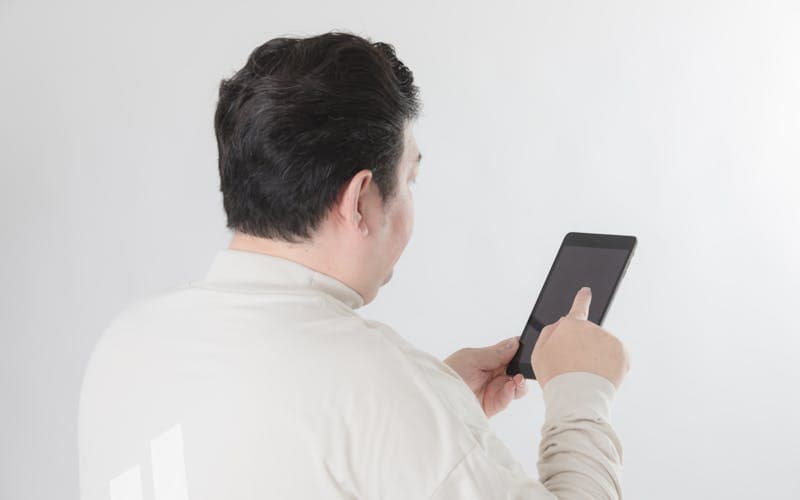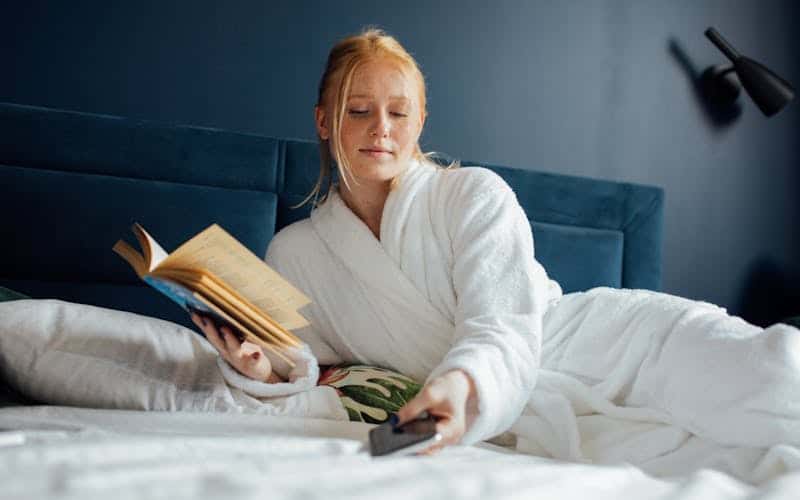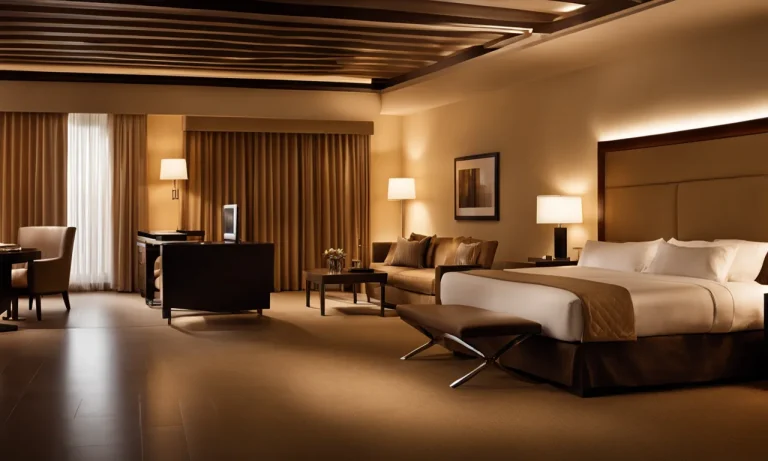Traveling can be difficult for people who are Deaf or hard of hearing. Trying to communicate with hotel staff and understand important announcements is frustrating when you have hearing loss.
Thankfully, some hotels now offer communication access rooms to better serve Deaf and hard-of-hearing guests.
If you’re short on time, here’s a quick answer: A communication access hotel room has features like visual alerts and notifications, amplified phones, and technology to communicate with staff to make stays more comfortable for those with hearing loss.
In this comprehensive guide, we’ll explain what a communication access hotel room is, what kind of features are offered, how to request one, and the benefits these rooms provide for Deaf and hard of hearing travelers.
What is a Communication Access Hotel Room?
A Communication Access Hotel Room is a specialized accommodation option designed to cater to the needs of individuals with communication disabilities.
These rooms are equipped with various assistive technologies and features that enhance communication accessibility for guests with speech, hearing, or cognitive impairments.
Official definition and certification
Communication Access Hotel Rooms are officially recognized and certified by organizations such as the Communication Disabilities Access Canada (CDAC) or the American Hotel and Lodging Association (AHLA).
These organizations set standards and guidelines for hotels to follow in order to ensure that their communication access rooms meet the needs of individuals with disabilities.
Hotels that meet the necessary requirements can apply for certification and display the official communication access symbol, indicating that they have made the necessary adaptations to provide an inclusive and accessible experience for all guests.
Purpose of communication access rooms
The main purpose of communication access rooms is to create an inclusive and comfortable environment for guests with communication disabilities. These rooms are designed to remove barriers and provide the necessary tools and technologies for effective communication.
Communication access rooms may include features such as visual alarm systems for individuals with hearing impairments, amplified telephones for individuals with hearing loss, and text-to-speech communication devices for individuals with speech disabilities.
Some rooms may also have visual communication boards or tablets with pre-programmed phrases for easier communication.
By providing these accommodations, hotels ensure that guests with communication disabilities can communicate effectively with hotel staff, access essential services, and enjoy their stay without facing unnecessary barriers.

How they differ from standard accessible rooms
While standard disability accessible rooms are designed to cater to a wide range of disabilities, communication access rooms specifically focus on addressing the unique needs of individuals with communication disabilities.
Standard accessible rooms may have features such as wider doorways, grab bars in the bathroom, or wheelchair-accessible facilities. However, these rooms may not always have the specialized communication tools and technologies that individuals with communication disabilities require.
Communication access rooms go beyond the basic accessibility requirements and provide additional features and resources to ensure effective communication. They are equipped with assistive devices and technologies that enable guests with communication disabilities to communicate with hotel staff, access information, and utilize essential services.
It is important to note that not all hotels offer communication access rooms. Travelers with communication disabilities should check with the hotel in advance to ensure that their specific needs can be met during their stay.
Features of a Communication Access Hotel Room
Flashing alerts and notifications
In a communication access hotel room, one of the key features is the presence of flashing alerts and notifications. These alerts are designed to assist individuals with hearing impairments or who may have difficulty hearing standard audible alarms or notifications.
The flashing alerts can be found in various areas of the room, such as the fire alarm system, doorbell, and phone. This ensures that guests with hearing impairments are alerted to any important notifications or emergencies that may occur during their stay.
Amplified phones
Another important feature of a communication access hotel room is the availability of amplified phones. These phones are equipped with technology that increases the volume of incoming and outgoing calls, making it easier for individuals with hearing loss to communicate effectively.
Amplified phones often have adjustable volume settings, allowing guests to customize the sound to their specific needs. This ensures that guests can easily communicate with hotel staff, make reservations, or contact their loved ones during their stay.
Video phones or tablets for communicating with staff
Communication access hotel rooms may also provide video phones or tablets for guests to communicate with hotel staff. These devices allow guests with hearing impairments to engage in real-time video conversations with hotel staff, ensuring effective communication and understanding.
By utilizing video communication, guests can easily convey their needs, ask questions, or seek assistance without any barriers. This feature promotes inclusivity and enhances the overall experience of guests with hearing impairments.

Alarm clocks with vibration option
To ensure that individuals with hearing impairments can wake up on time, communication access hotel rooms often feature alarm clocks with a vibration option. These alarm clocks are designed to provide a tactile alert, vibrating at the set wake-up time.
This feature allows guests to rely on their sense of touch rather than sound, ensuring that they do not miss any important appointments or activities during their stay.
Closed captioning on TVs
In order to cater to guests with hearing impairments, communication access hotel rooms typically offer closed captioning on their televisions. Closed captioning is a feature that displays text on the screen, providing a written transcript of the audio content.
This allows individuals with hearing loss to fully enjoy and understand the programs or movies they are watching. Closed captioning can be easily activated or deactivated based on the guest’s preference.
TTY kit available upon request
For guests who require a TTY (Text Telephone) device, communication access hotel rooms often have TTY kits available upon request. A TTY device is a telecommunications device that allows individuals with hearing or speech impairments to communicate via text messages.
These kits typically include a TTY device along with instructions on how to use it. By providing TTY kits, communication access hotel rooms ensure that guests with hearing impairments have the necessary tools for effective communication during their stay.
Benefits for Deaf and Hard of Hearing Travelers
Enhanced safety
One of the major benefits of communication access hotel rooms for deaf and hard of hearing travelers is enhanced safety.
These rooms are equipped with various safety features such as visual fire alarms and flashing lights in case of emergencies. This ensures that individuals with hearing loss are alerted promptly and can take necessary actions to evacuate the premises.
Reduced frustration and stress
Communication access hotel rooms greatly reduce frustration and stress for deaf and hard of hearing travelers.
These rooms are designed with assistive technologies such as visual doorbells and vibrating alarm clocks, which allow individuals to be notified of important events or alerts without relying on auditory cues. This eliminates the need for constant reliance on others for information and enhances the overall travel experience.

Improved sleep quality
Another advantage of communication access hotel rooms is improved sleep quality for individuals with hearing loss.
These rooms often come with specialized devices, such as bed shakers or vibrating pillows, which can be connected to fire alarms or wake-up calls. This ensures that individuals are alerted without disrupting their sleep, allowing them to have a restful night and wake up refreshed.
Increased independence
Communication access hotel rooms promote increased independence for deaf and hard of hearing travelers.
With features like closed captioning on televisions and video phones for communication, individuals can engage in activities and connect with others without relying on external assistance. This empowers them to explore new places and enjoy their travel experiences with greater freedom and confidence.
How to Request a Communication Access Room
Call the hotel accessibility line
One of the easiest ways to request a communication access room is by calling the hotel’s accessibility line.
Many hotels have dedicated staff members who are knowledgeable about the specific needs of individuals with communication disabilities. By calling this number, you can speak directly with someone who can assist you in making your request.
If you’re unsure about the accessibility line, you can usually find the phone number on the hotel’s website or by doing a quick internet search.
Remember to have your reservation details handy when making the call, as this will help the staff better understand your needs.
Use the hotel’s online form
Another convenient way to request a communication access room is by using the hotel’s online form.
Many hotels have a dedicated section on their website where you can submit special requests, including the need for communication access. Simply fill out the form with your reservation details and specify your requirements for a communication access room.
Some hotels may ask for additional information, such as the type of communication access you require (e.g., visual aids, assistive devices, sign language interpreters). Providing as much detail as possible will help the hotel staff accommodate your needs effectively.
Email the hotel directly
If you prefer written communication, you can email the hotel directly to request a communication access room. Look for the hotel’s contact information on their website or search for their email address online.
Compose a polite and concise email explaining your reservation details and the specific accommodations you require.
It’s a good idea to send the email well in advance of your stay to allow the hotel adequate time to make arrangements. Be sure to include your contact information, so the hotel can easily reach you if they have any questions or need further clarification.
Verify request at check-in
Once you have made your request for a communication access room, it’s important to verify the accommodations at check-in. When you arrive at the hotel, inform the front desk staff about your specific needs and ask them to confirm that a communication access room has been reserved for you.
Double-checking at check-in ensures that there are no misunderstandings or oversights. If there are any issues, the hotel staff can address them promptly and find a suitable solution. Remember, it’s always better to be proactive and confirm your request to ensure a smooth and enjoyable stay.
If you need further guidance on requesting a communication access room, you can visit the ADA website for more information on accessible accommodations and your rights as a guest.
Certification and Training Requirements
Certification process for hotels
To become a certified Communication Access Hotel Room, hotels must go through a rigorous certification process. This process ensures that the hotel meets the necessary requirements to provide communication access to individuals with disabilities.
The certification is typically conducted by an independent organization or agency that specializes in accessibility standards. The process includes a thorough evaluation of the hotel’s facilities, amenities, and services to ensure they meet the specific needs of individuals with communication disabilities.
This evaluation may include a review of the hotel’s communication devices, assistive technology, and staff training programs.
Disability awareness training for staff
One of the key requirements for a Communication Access Hotel Room certification is that the hotel staff receives disability awareness training. This training is designed to educate staff members on how to effectively communicate with individuals who have communication disabilities.
It covers topics such as understanding different forms of communication, using alternative communication methods, and promoting inclusivity and accessibility in the hotel environment.
By providing this training, hotels can ensure that their staff members are equipped with the knowledge and skills to provide excellent service to all guests, regardless of their communication abilities.

Ongoing quality control audits
Once a hotel has obtained the Communication Access Hotel Room certification, it is important to maintain the standards of communication access. To ensure ongoing quality control, regular audits are conducted by the certifying organization or agency.
These audits assess whether the hotel continues to meet the requirements for communication access and if any improvements or adjustments are needed. The audits may include on-site visits, interviews with staff and guests, and evaluations of communication devices and assistive technology.
By conducting these audits, hotels can demonstrate their commitment to providing inclusive and accessible communication services to all guests.
Conclusion
Communication access hotel rooms allow Deaf and hard of hearing guests to enjoy safe, comfortable, and stress-free stays.
With amenities like visual alerts, amplified phones, and technology to communicate with staff, these rooms empower travelers with hearing loss to independently navigate the hotel experience.
By requesting a communication access room during booking or check-in, guests can ensure their unique needs are met.






